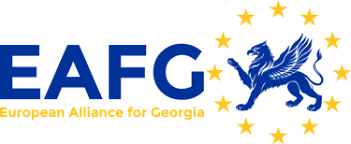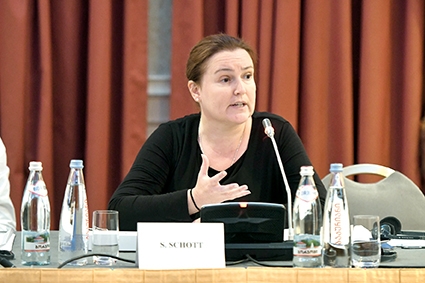The West, Georgia & Religion – as Seen by a Scholarly Nun
Exclusive Interview
A recent study found out that in only two countries, Georgia being one and Ghana the other, the young are more religious than the old. This further reinforced the already obvious truth that religion plays a huge role in Georgia, just as it has throughout the centuries. With the Church being the country’s most trusted institution and the Patriarch’s approval rating invariably sky-high, it’s little wonder that foreign dignitaries, EU diplomats chief among them, often come to pay homage and learn the Church’s perspective on things going on in and around the country. Georgia’s EU aspirations are no exception, especially given the fact that religion often comes up as one of the shielding points for the Euroskeptics who claim that approximation with Europe and the West will mean the need to give up religious and so-called traditional values, vague as that term might be. Is the West really devoid of spirituality? Does Georgia’s European aspirations pose a danger to the Church and the religious? These were the two pivotal questions that GEORGIA TODAY posed to Professor Sandra Schott during an exclusive interview in Brussels. Mrs. Schott is not just another scholar – born Catholic, she converted to Orthodoxy during a tumultuous period that she spent in the Balkans in the late 90s, and remains a serving nun to this day. Professor Schott is also one of the founders and driving forces behind the European Alliance for Georgia, courtesy of which we have been presenting you our Message from Brussels series. Knowledgeable of the spiritual stances at either side of the great East-West religious divide, she was keen to offer her comparative analysis on the matter.
The religious Euro-skeptic wing often alludes to there being no spirituality left in Europe. Do you consider the statement true?
I would consider it as somewhat true because we come from a historical background that is still a little bit confused. This doesn't mean the West is totally removed from spirituality, but it means that it’s more distanced from certain types of spirituality, such as keeping the mystery of faith a mystery and not trying to define that which we do not know. I see Western society as being quite humble when it comes to understanding the faith not from a perspective of pure logic.
The same skeptics insist that “like the West,” Georgia too will lose its faith if it remains on its European path.
I understand the logic, I understand why it happens and I think it’s partly true. If Western society doesn’t solve the spiritual issue, it will hit a crisis point. While there are people in the West on a continual search to find or re-discover purpose and spirituality, there are also people on the other end of spiritual evolution, people who I’d say have gone out of their minds and disregard spirituality altogether.
Had I posed the same question to a European politician, I'm pretty sure the answer would be related to human rights rooted in Christian values. Might we be heading to a stage where the human rights concept replaces spirituality?
It cannot replace it. We have a philosophical school of thought active today which dates from the 16th century called humanism, but humanism is not Christian spirituality and we are mixing it up. For me, human rights are a product of humanism, not a product of Christianity. But then again, Christianity is much more developed when it comes to the question of human rights, say in the sense of the question of the balance between Man and the way to God.
But the human rights concept seeks to remove God from the equation, placing humans as free and right-thinking without need of higher guidance.
In the West, humanism has become, let’s say, the base of the loop and this now tries to erase the origin even of humanism and adjust itself to the political needs of the current world order, which is very dangerous. It comes from the fact that the Church is disconnected politically from society, it’s no longer a bridge between people and the State. This originates in the past with the Western Church being too submissive to politicians. In the Byzantine world, it was a different setting.
The Georgian Orthodox Church and State are seen as almost equal partners, while in the West, churches are seen as subservient to the State.
True, and this is why when a church somewhere gets a bit of influence, the people start demanding it be curtailed. If the Church does not interfere and influence the affairs of the State, there should be no problem with it having an influence.
How about the Church becoming too powerful and not subservient to the State but a substitute to it?
This would mean the state is not strong enough and that the responsibilities are not being carried out correctly, leaving people restless and seeking change.
You’re not a great fan of secularism, then?
No. But I don't think that it's the role of the Church to speak about the things they shouldn’t. If you want the Church to be responsible for everything in society, then it at least needs to be efficient and know and engage in the things that need to be engaged in in today's world. This means understanding the trends, trying to see what is happening and also giving knowledgeable and relevant opinions. Not being adapted to the situation and remaining stuck in traditionalism would not work in this instance.
What role can religion play in Georgia when it comes to the country's European aspirations?
The Church is doing and will do a lot of good just by discussing the matter with the people; by continuing to help maintain the dialogue. I’m concerned that the dialogue might still not be strong enough because Georgia had to fight so hard for its religious freedom in the form of direct confrontation that it might prove difficult to communicate the same goals without a fight, continuing to construct communication without entering any kind of war.

By Vazha Tavberidze












